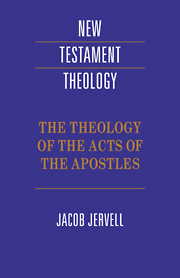6 - The significance of Acts for today
Published online by Cambridge University Press: 05 June 2012
Summary
The modern study of Acts has been occupied with the question of the original setting and meaning of the document. Is it possible, in this document from the first century, to find any contemporary significance, that is apart from the significance every historical document has as a witness to history as such? The question about contemporary significance concerns whether Acts has any place in contemporary theology and preaching, apart from as a part of our Christian inheritance, or whether the arguments of the author are completely locked in the presuppositions of the past? Certainly, all of the theological arguments are determined by the world in the first Christian century. Still some of the basic theological thoughts transcend the first century. It is out of the question to attempt to apply contemporary significance to the whole of Acts for the modern reader, at least for those who read the New Testament for spiritual profit, but when making such an application the conditio sine qua non is that our contemporary interpretation must be true to the original meaning. There are two addressees for this contemporary significance: the church, and the world to which the church addresses its message.
Acts has never felt alien to the readers, thanks to Luke's great skill as narrator. Our picture of the history of the early church comes in largest measure from Luke: even Paul's own letters have been far less influential than Acts in enabling readers to gain an understanding of his life and work. Luke's history of the church, built up in episodes and stories, is easily accessible to modern readers.
- Type
- Chapter
- Information
- The Theology of the Acts of the Apostles , pp. 128 - 136Publisher: Cambridge University PressPrint publication year: 1996



